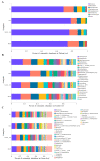Ethanol Extract of Mao Jian Green Tea Attenuates Gastrointestinal Symptoms in a Rat Model of Irritable Bowel Syndrome with Constipation via the 5-hydroxytryptamine Signaling Pathway
- PMID: 36900618
- PMCID: PMC10000491
- DOI: 10.3390/foods12051101
Ethanol Extract of Mao Jian Green Tea Attenuates Gastrointestinal Symptoms in a Rat Model of Irritable Bowel Syndrome with Constipation via the 5-hydroxytryptamine Signaling Pathway
Abstract
In a previous study, we demonstrated that the hydro extract of Mao Jian Green Tea (MJGT) promotes gastrointestinal motility. In this study, the effect of MJGT ethanol extract (MJGT_EE) in treating irritable bowel syndrome with constipation (IBS-C) in a rat model constructed via maternal separation combined with an ice water stimulation was investigated. First, a successful model construction was confirmed through the determination of the fecal water content (FWC) and the smallest colorectal distension (CRD) volume. Then, the overall regulatory effects of MJGT_EE on the gastrointestinal tract were preliminarily evaluated through gastric emptying and small intestinal propulsion tests. Our findings indicated that MJGT_EE significantly increased FWC (p < 0.01) and the smallest CRD volume (p < 0.05) and promoted gastric emptying and small intestinal propulsion (p < 0.01). Furthermore, mechanistically, MJGT_EE reduced intestinal sensitivity by regulating the expression of proteins related to the serotonin (5-hydroxytryptamine; 5-HT) pathway. More specifically, it decreased tryptophan hydroxylase (TPH) expression (p < 0.05) and increased serotonin transporter (SERT) expression (p < 0.05), thereby decreasing 5-HT secretion (p < 0.01), activating the calmodulin (CaM)/myosin light chain kinase (MLCK) pathway, and increasing 5-HT4 receptor (5-HT4R) expression (p < 0.05). Moreover, MJGT_EE enhanced the diversity of gut microbiota, increased the proportion of beneficial bacteria, and regulated the number of 5-HT-related bacteria. Flavonoids may play the role of being active ingredients in MJGT_EE. These findings suggest that MJGT_EE could serve as a potential therapeutic pathway for IBS-C.
Keywords: 5-hydroxytryptamine; Mao Jian Green Tea; ethanol extract; flavonoids; gastrointestinal motility; gut microbiota.
Conflict of interest statement
The authors declare no conflict of interest.
Figures







References
Grants and funding
LinkOut - more resources
Full Text Sources

